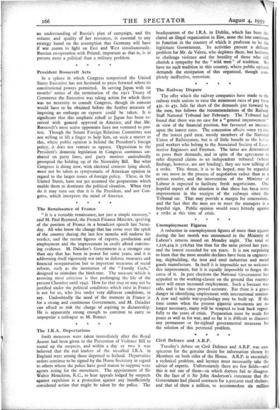President Roosevelt Acts In a sphere in which Congress temporised
the United States Executive has not hesitated to press forward where its constitutional powers permitted. In serving Japan with six months' notice of the termination of the 1911 Treaty of Commerce the Executive was taking action for which there was no necessity to consult Congress, though its consent would have to be obtained before the further measure of imposing an embargo on exports could be taken. It is significant that this emphatic rebuff to Japan has been re- ceived with general approval in America, and that Mr. Roosevelt's most active opponents have not ventured to pro- test. Though the Senate Foreign Relations Committee was not willing to lift a finger to help him, on such a matter as this, where public opinion is behind the President's foreign policy, it does not venture to oppose. Opposition to the President's domestic legislation in Congress continues un- abated on party lines, and party motives undoubtedly prompted the holding up of the Neutrality Bill. But what Congress is doing now, with electoral contests lying ahead, must not be taken as symptomatic of American opinion in regard to the larger issues of foreign policy. These, in the United States, have not yet assumed the proportions which enable them to dominate the political situation. When they do it may turn out that it is the President, and not Con- gress, which interprets the mind of America.








































 Previous page
Previous page